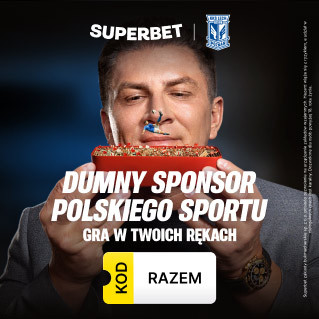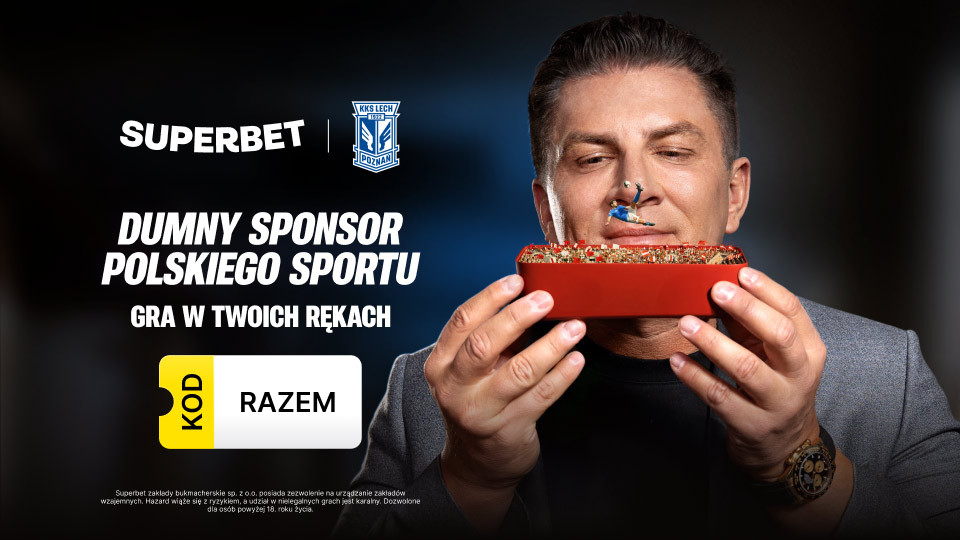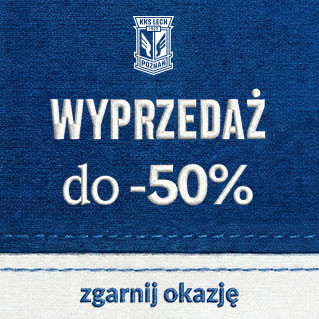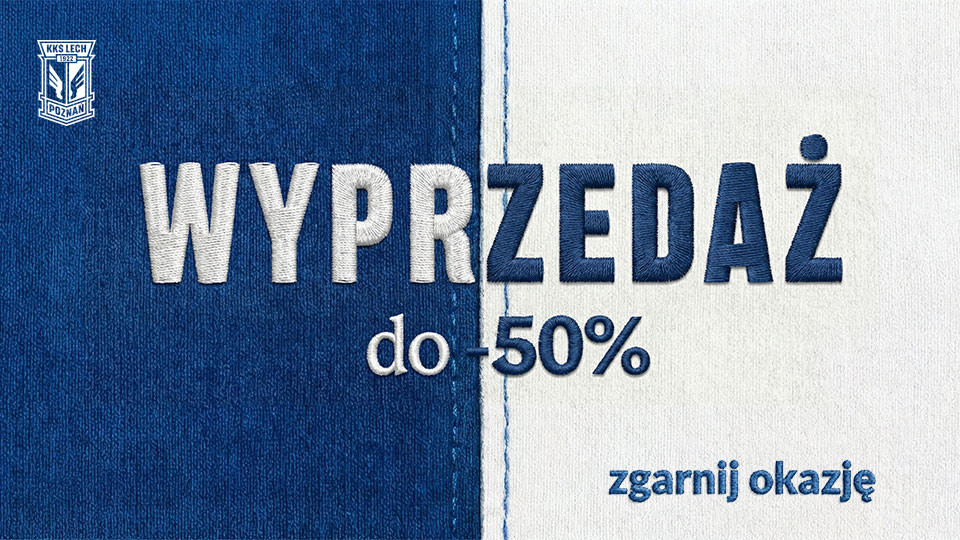From 1922 until today
-
1922
The club is said to have been registered on March 19th, 1922. Therefore, that date is considered to be the official birthday of the club.
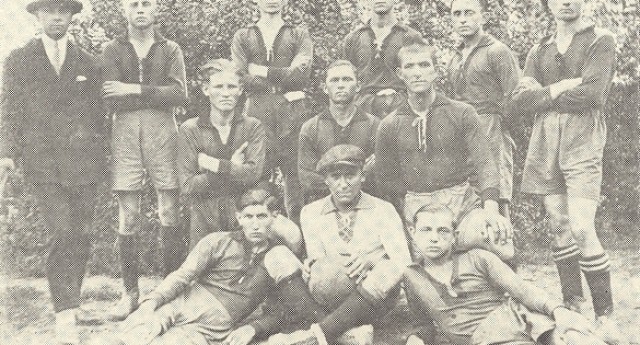
The beginnings of Lech's history are linked to an organization that wasn't directly connected to the sport - Catholic Youth Society. In 1920 the youth finally decided to abandon the relatively passive society and form its own football team. The registration of the club took place on a Sunday, on March 19th, 1922. Therefore, that is the date considered as the official birthday of Lech.
-
1922
The name of the club has been changed to Sport Association Dębiec League.
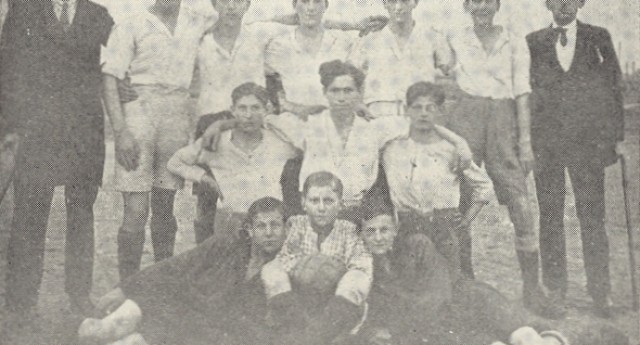
On August 4th 1922 the name of the club was changed to Sport Association Dębiec League. On September another success came as the founding members managed to lease a land for a pitch at 17 Grzybowa Street. On September 17th 1922 the first match, played against Sparta Poznań, took place and ended with a 1:1 draw. The team had to begin from the lowest levels, thus the C-class.
-
The 20's
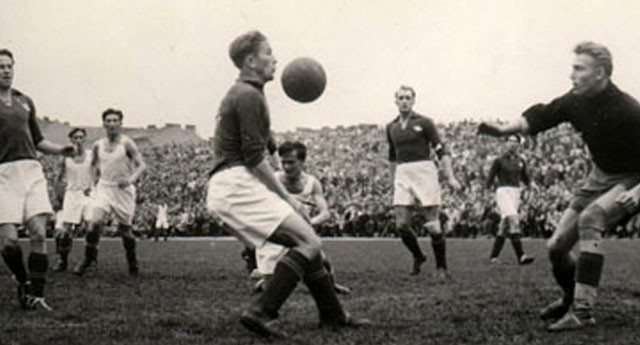
Jan Dyzman, a treasurer who sang in a choir during his free time, suggested that the club was named Lutnia (the choir he was a member of was called the same, too). The idea was approved by his teammates, however on September 4th the club was renamed to Sport Association Dębiec League. The name was significant since most of the youth that played at the club inhabited Dębiec district.
Jan Nowak was the first chairman, but he occupied the seat for a few months only, having been called by the army. On September 4th when the final decision about the new name of the club had to be taken, Antoni Stachowski became the chairman.
On June 29th, 1924 the team debuted in the league and won with Ruch Poznań 5:3. The result was later verified and changed to a 3:0 win since the rival's squad did not fully obey the rules of the game.
Similarly to many other clubs, Sport Association Dębiec League had problems with the payment of obligatory dues and has been suspended for a specific period of time. In January 1925 Dębiec district became an official part of Poznań city and the club changed its name to Sport Association Poznań League.
During this period of time the fight for power took place. In 1925 Leon Nowicki became the chairman of the club, just to be replaced by Stanisław Dereziński a few months later. In the mean time, the club strengthened and soon was considered one of the best in its region.
In 1927 Sport Association Poznań League won 17 out of 22 matches (and drew three of them). On April 10th 1927 the club beat Helios Czempin 9:0. Łucjan Kunz scored 7 goals in that game. It was the best results achieved by an individual player in the history of the club, until Włodzimierz Jakubowski came along and produced a similar score. That same season the club was promoted to B-class.
In the mean time a reserve team was created, which only empowered the rivalry. The players at the club fought of the games as an opportunity to promote themselves and be noticed by another team at which they could earn a living. At Sport Association Poznań League wages were only Dereziński's distant plans.
In 1928 the B-class league was relatively solid, with 5 qualification groups. At that point Sport Association Poznań League performed really well, losing to the winners of the group only (1928, 1929), which placed them second.
The club still lacked official colors and a crest. At first the team wore red shirts sewed by Buchert company. The blue colors were adopted when the club was linked to the railway and moved to the stadium located at Dzierżyńskiego Street. However, that only took place about 30 years after the club's been formed.
Lech finally got promoted to the highest-ranked league in the region in 1932. Later the regulations were changed and the teams from A-class got a chance to qualify to the I national league. The players from Dębiec failed to join the top of the national football before the II World War began, but another historical event took place in the mean time. In Autumn 1933 KPW (Railway Army Training Organization) formed a sports club that shortly after the end of the war searched for a way to bring football back to life in Poznań. Lech was the first club that has been reactivated after the war!
-
The 30's
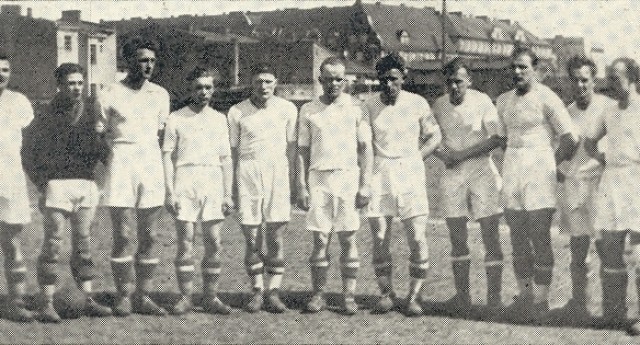
Stanisław Dereziński wanted the club to develop constantly. His position at the railway as the manager of the Technical-Traffic Raport enabled him to initiate a cooperation between the club and his employer.
In 1929 a paramilitary organization - KPW (Railway Army Training Organization) - was formed and it soon gained wide-spread popularity. Lech became a part of it in May 1930 and since then the club was officially called KPW Sport Club Poznań Railway Station. The aim of the club remained the same - qualify to the A-class. In 1930 the team won its qualification group, but failed in the crucial clash and therefore stayed in the B-class. However, a year later the club finally moved up the ladder.
KPW Sport Club Poznań Railway Station was ranked third, but since Posnania's matches sent people striking on the streets, the club was taken away three points and that changed the table, at last allowing KPW Sport Club Poznań Railway Station to qualify to A-class. Since the league was a hinterland to Ekstraklasa, the winner was awarded a chance to fight for the national championship.
Not only did KPW Sport Club Poznań Railway Station gain popularity, but also success. On November 29th, 1931 the club faced the Polish Champion, Warta Poznań, and won 6:1. It is worth emphasizing that Warta sent its best starting lineup against Lech.
After the qualification to the A-class, the club decided to hire a coach. Stanisław Kwiatkowski was the first man to lead KPW Sport Club Poznań Railway Station and guided them to success. In 1932 the club was ranked second, in 1933 third and in 1934 fifth.
In 1933 the club's name was changed for the last time before the war. KPW Sport Club Poznań Railway Station was renamed to KPW Sport Club Poznań and Józef Chrobak, a member of KPW, became its chairman. In December 1934 he was replaced by Stanisław Trygalski.
The league's organizational forces changed the system of the competition before the season in 1934 kicked off. The league used to last from spring to autumn, but now the season began in autumn and ended in spring. In order to assure a smooth transition and adaptation process, in 1934 the season wasn't divided into 2 rounds.
In 1934 Edmund Słomiak was the first footballer competing for KPW Sport Club Poznań to be named a representative of Poznań. The same player later joined Warta Poznań, which fought in the highest-ranked league in the country.
The change in the league system did not influence the players positively and the form gradually degraded. In 1935 a 15 year-old Edmund Białas debuted and for the next 56 years and 125 days, right until his death on July 24th, 1991, the footballer remained involved with the club. In the same year KPW Sport Club Poznań suffered the highest loss in the history. HCP Poznań beat the club 12:4.
In Autumn 1936 A-class was renamed to Regional League. Another change took place in the mean time. Kwiatkowski was replaced by a Hungarian coach László Marcai.
In 1936/37 HCP Poznań assured itself the highest rank in the Regional League, while KPW Sport Club Poznań fought for the second place with Legia Poznań. The rivalry between the two clubs continued for the next two seasons, but it was Legia Poznań that turned out to be better, twice.
While HCP Poznań and Legia Poznań both failed to achieve success in the highest-ranked league, the fans of KPW Sport Club Poznań hoped their club could do better, especially that the team performed really well in friendly matches (e.g. won with Polonia Warsaw (5:0), Bronia Radom (3:2), Unia Sosnowiec (7:2) and Gryf Toruń (3:0)). The league's launch on August 27th, 1939 was postponed a week due to the political situation. However, season 1939/40 never took off...
-
The 40's
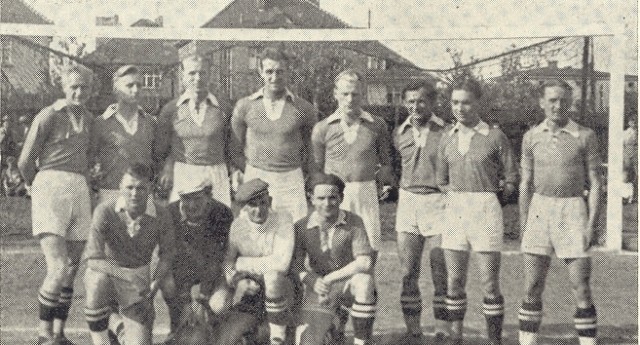
Due to the war and the fact that many players were involved on the war fronts, the league was suspended. Nevertheless, the hunger for the football entertainment remained and in August 1940 an Organizational Committee of City Football Championships was created. Most of the footballers were forced to leave Poznań, and therefore couldn't compete, but those who stayed, played whenever could.
In 1940 the City Championships, by many considered unofficial, were won by Chwaliszewo, who turned out to be better than its three rivals - Strzelecka, Woźna and Wilda.
In 1941 9 teams participated in the competition and two seperate groups were formed. The tournament lasted 5 weeks and footballers from Górczyn and Dębiec KPW won their groups. On September 7th 1941 Dębiec and Strzelecka met in the final, but gendarme stopped the match and it was never resumed.
A year later the championships did not take place and in 1943 they were aborted once again. On March 1945 the final from 1941 was repeated.
As the war approached an end, people began to think of a way to resume the league. On February 28th 1945 Leopold Krzyżanowski, once of the KPW members from before World War II, began working at the railway again. He received a permission to take over the stadium in the Dębiec region and even though it hasn't been clearly stated, KPW Poznań League was brought to life once again.
On March 16th 1945 Józef Chrobak was named as the new chairman of the Railway Sport Club. As the club rose back to its feet, new chairmen were chosen, mostly from the railway employment structures.
The club participated in the repetition of the City Championships from 1941. In the final Railway Sport Club beat Warta Poznań 1:0. The league was resumed in July 1945. In the first league clash after the war the future star Teodor Anioła debuted. Railway Sport Club faced Polonia Jarocin and won 11:1.
28 teams participated in the qualification to the top Polish league in 1948. The clubs were divided into three groups. The winner of each groups advanced to Ekstraklasa. Before the first qualification match took place, the official 'fusion' of Railway Sport Club and Pogonia Sport Club was confirmed.
One of the conditions of the 'fusion' was a new name which contained the word Pogon. Nevertheless, the journalists remained using the name Railway Sport Club. A year later after the name was approved by the board, another change came and the club was renamed again. The word 'Pogoń' was dropped and the club which was founded in 1914 vanished from the map, never to be reborn.
The fight for the qualification to Ekstraklasa was exhilarating. Railway Sport Club was ranked fourth, but after a reexamination of the match against Polonia Bytom, the club moved a place up the rank. In January 1948 one of Polonia Świdnica players testified under the oath that two footballers in Polonia's squad played under a false name. Ekstraklasa now consisted of 14 teams, two more than before, and therefore Railway Sport Club qualified to the top league.
In the first Ekstraklasa match played on March 14th 1948, Railway Sport Club lost against Widzew 4:3. The team from Łódź had a great kick-off, but many losses followed and eventually they fell to the lower league.
The famous newspaper "Start" criticized the match of the two recently qualified clubs and undermined their competence to play in Ekstraklasa. Nevertheless, the club from Dębiec was ranked sixth, won the award "for the fairest playing team in 1948", while its three players, Czapczyk, Anioła and Białas gradually became stars. The famous ABC trio scored 40 goals in 1949 (Anioła - 20, Białas - 12, Czapczyk - 8). That same season the club was placed third in the league.
-
The 50's
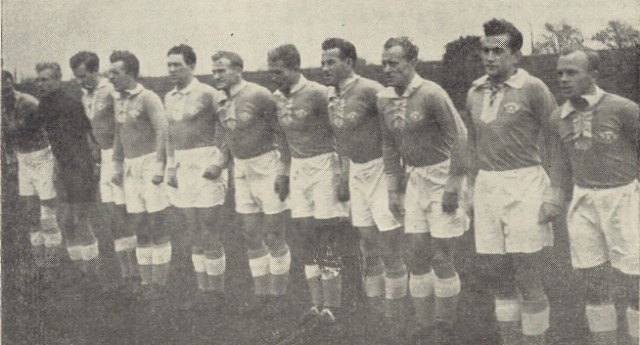
The 1950 season was a successful one for the club, especially thanks to Teodor Anioła who scored 20 goals and became the top scorer in the league. He achieved similar numbers three seasons in a row. Moreover, the average 2,72 goals per match is an impressive statistic, too. The club was placed third that year due to the poor performances away from home. Another interesting anecdote: the match against Szombierki Bytom (August 11th, 1950) began at 10 o'clock which is the earliest kick-off time in the history of the club from Dębiec.
The third place wasn't exactly a dream result and therefore the club hired a new coach. Antoni Bottcher was replaced by Adam Walter, but the latter couldn't lead the club higher than the 8th place and that is why Bottcher was given another chance a season later.
Lech's performance weakened and the club failed to stabilize their situation. Numerous changes of the coach – most of them leaving after a season – positions no higher than the 6th rank and the end of the ABC trio resulted in a degradation of the form.
In 1953 Czapczyk retired in the match against Wisla Cracow. That same year the longest match in the history took place. On November 15th the club from Dębiec faced Stal Mielec in the Polish Cup. The game lasted 128 minutes and at last Lech lost 1:2.
The next season wasn't any better. Lech played 20 matches and in 10 of them the team failed to score. In total, Lech scored 14 goals only and 11 of them thanks to Anioła. However, there were a few glimpses of hope. For instance, in 1956 after the fourth league round the team was placed first.
Nevertheless, the "Black Friday" had a big influence on the players and at last they did not achieve anything spectacular in 1956. The interest in the club remained and in 1957 the board decided to expand the stadium to a capacity of 20,000 people
However, that same season Lech fell to the lower league and three goalkeepers left the squad. The 17 year-old Marian Wilczyński, who played at the club for 4 years, took advantage of the situation. The youngster appeared in all 22 matches of the next season. After the degradation, the club decided to fire Mieczysław Tarka who has been the coach for the past three years.
Lech was determined to return to the top league as quickly as possible, but in the end it took the team three years to qualify again. In 1959 Anioła, the club's best player, expressed interest in a transfer to Warta Poznań, the local rival. The footballer even took part in the team's training session. The board responded with a 6-month suspension of the player. Anioła joined the first team on November 8th 1959 and scored 8 goals in the clash against Polonia (final score – 15:1).
-
The 60's
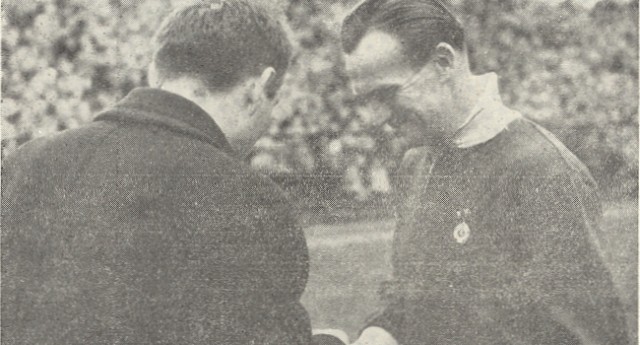
In 1960 Lech returned to the top Polish league, but in 1963 another degradation took place and this time the club needed 9 years to qualify again. In the mean time, Lech fell to the III league, also referred to as the League of the Voivodeships. Jerzy Kopa was the most successful figure of the period. He took over the team in 1976 when the club was occupying the last rank in the league. The coach took the team to a grouping, also called "The Miracle in Błażejewko", since not only did Lech manage to stay in the league, but also qualified to the international competition and was placed third!
-
1976-1990
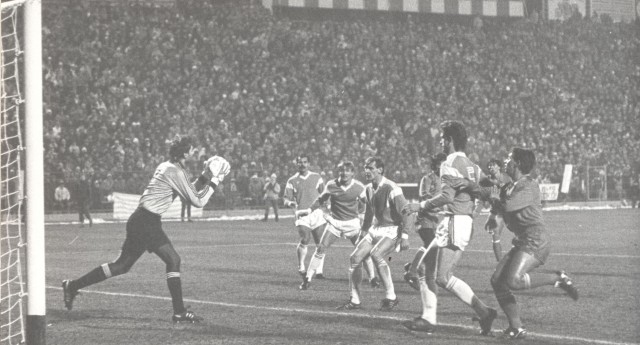
Lech's debut on the international arena took place on September 13th, 1978 in a match against MSV Duisburg. The Polish team lost twice, 0:5 and 2:5, and was given a lesson of great football. The successes that followed are linked to Wojciech Łazarka who took over the team in 1980. That same year Lech reached the final of the Polish Cup (lost against Legia 0:5). Two years later the team from Poznań won the Polish Cup final, this time against Pogoń (1:0). In 1983 and 1984 Lech triumphed in the country. Two championships, another cup and a few international matches against the rivals like Aberdeen, Athletic Bilbao and FC Liverpool emphasize the achievements of the period. In 1988 the team from Poznań won another Polish Cup, this time against Legia (penalty shootout). That same year one of the most exhilarating international clashes took place. In the second round Lech faced Cruyff's FC Barcelona. Two draws (1:1) led to a penalty shootout that Lech at last lost.
-
The 90's
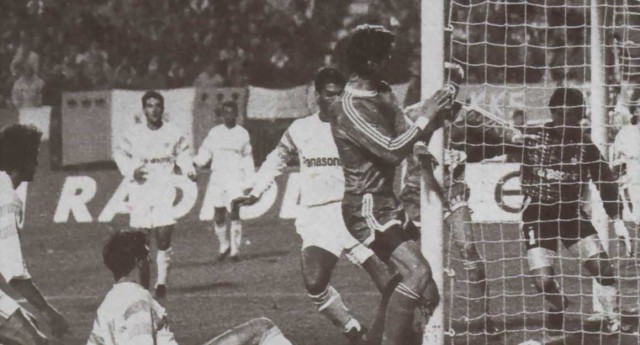
In 1990, 1992 and 1993 Lech won the championship. The club's most exhilarating matches of the last decade all date back to Autumn 1990. Back then the famous Olympique Marseille visited Poznań and lost 2:3. The second leg wasn't as successful since the Frenchmen won 6:1, however a food poising is said to be the reason of Lech's poor performance. Since 1993 and on every next season seemed to be worse than the previous one. Financial troubles forced the club to sell many great players. In 2000 an inevitable degradation took place and Lech left the top league for the first time in 28 years. The first season in the II league was terrible and the team was on the edge of further degradation. However, the year that followed Lech was promoted back to Ekstraklasa. The team from Poznań had one aim: secure a place in the top league. However, the season began poorly. Czesław Michniewicz was appointed as the coach 5 rounds into the season and it turned out to be a great decision since Lech ended the league on the 6th rank and won the Polish Cup, beating Legia Warsaw in the final. Two weeks later the fans celebrated the Super Cup. Although the next seasons weren't as successful, Lech always remained in the top part of the league rank.
-
2005-2010
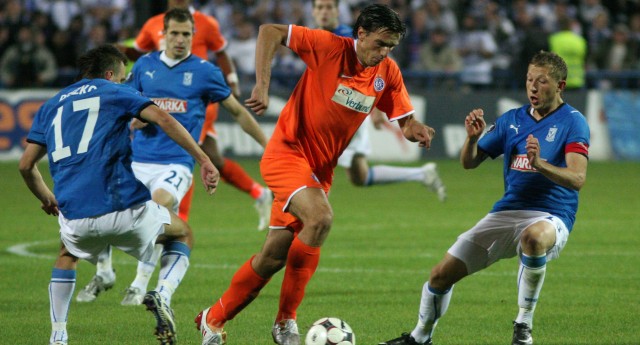
In 2005/06 changes in the ownership of the club took place. Holding Amica Wronki S.A. decided to invest in the club and since then a new name – KKS Lech Poznań S.A. – has been used. The team, now led by Franciszek Smuda, aimed at the championship, but was placed 6th in 2006/07 season. However, everyone knew that some time would pass before the team became great once again. One of the most unforgettable moments in the club's history is the two-leg clash with Austria Vienna. Lech, after an exhilarating second leg, advanced to the UEFA Cup group phase (2008/09). It was Murawski's last-minute shot that allowed the team from Poznan to stay in the game. The group phase was a success too. Lech was better than its two group rivals, Nancy and Feyenoord Rotterdam and therefore advanced further, where Udinese was already waiting. However, the Italians turned out to be better.
Even though Lech did not win the championship in 2008/09, the club won the Polish Cup for the first time since 2004. Lech beat Ruch Chorzów in the final (1:0) thanks to goal from Peszko. Two months later another trophy was added to the closet. This time Lech won the Super Cup final where the team from Poznań faced Wisła Cracow (penalty shootout). The first months of the 2009/10 season weren't too hopeful. Under the lead of the new coach, Jacek Zieliński, the team was eliminated by Club Brugge from Europa League and failed to reach the Polish Cup final after Stal Stalowa Wola, a lower-ranked team, beat Lech. However, the second round in the league was a great one and Lech managed to surpass all its rivals, winning the first championship since 1993. Moreover, Robert Lewandowski, Lech's forward, became the best goal-scorer of the season.
-
2010-2015
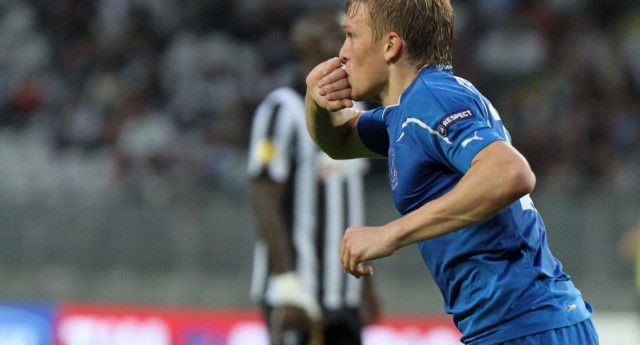
Successes came, expectations followed. In 2010/11 Lech was meant to qualify to Champions League group stage. However, Sparta Prague stopped Lech from reaching its aim. The team from Poznan beat Dnipro and advanced to Europa League group phase where Manchester City, Juventus and FC Salzburg were waiting. Lech surprised the whole continent and ended the group phase second, just behind Manchester City. However, due to poor results in the league, Zieliński was replaced by former Barcelona player, Jose Mari Bakero. The great adventure on the European arena ended with a loss to Sporting Braga. The 5th rank in the league did not meet the expectations. In addition, Lech lost in the Polish Cup final to Legia Warsaw.
2011/12 season began really well. Bakero's team came close to the top spot, but gradually the form degraded and a terrible series of lack of goals began. Nevertheless, it wasn't until February 2012 that Bakero was fired. Mariusz Rumak, the assistant coach, replaced the Spaniard. There were little expectations, but the coach led the team to a series of great matches and only in the last round did Lech lose its chance to win the championship. The fourth rank gave Lech a chance to qualify to the European competition. Artiom Rudnev scored 22 goals that season and joined HSV Hamburg in the summer.
The next season began with Europa League qualifications in July. Lech beat the team from Kazakhstan and Azerbaijan, but was stopped by the Swedish AIK Solna. A few days later Lech was eliminated from the Polish Cup by Olimpia Grudziądz. Thus before the season really began, the team from Poznań was fighting on one front only. Nevertheless, Lech completed the highest number of points in away matches, setting a historical record. Poor performances at home meant that the championship slipped through the fingers. The season 2012/13 is considered a historical one since it was the first time ever that Lech was a runner-up in the fight for the national championship.
The next season Lech was placed second too. This time it wasn't perceived as a success, but rather as a failure, since Lech not only lost to team from Vilnius in III Europa League qualification round, but was also eliminated from the Polish Cup by Miedź Legnica.
Next season Lech was humiliated on the international arena by Stjarnan F.C. – a loss that ended Rumak's career as a coach of Lech Poznań and for the next three months Krzysztof Chrobak led the team
On September 1st, 2014 Maciej Skorża was named as the new coach. Despite initial difficulties, the season was a successful one, both on the national and international arena. For the first time in a few years Lech qualified to the final of the Polish Cup. However, what counts the most is the win in the fight for the championship and the opportunity to compete for the Champions League group stage.
-
2015 - today
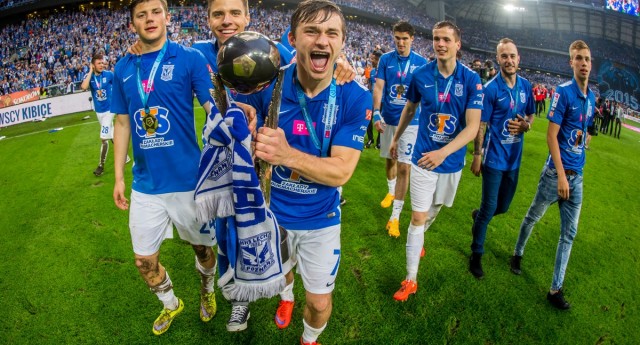
Lech lost in the II qualification round and it was FC Basel that took a step closer to the Champions League. Nevertheless, the fans from Poznań could watch their team compete in Europa League group phase. The competition was a glimpse of hope, since at the time Lech was placed last in the league. The club decided to fire Maciej Skorża and replace him with Jan Urban.
The new coach brought the team back to life. Lech even managed to beat Fiorentina 2:1 and leave the relegation zone. Nevertheless, spring was less successful and Lech ended the season on the 7th rank. The only achievement of the season was the Polish Cup final, in which Lech eventually was beaten by Legia Warsaw.
The 2016/17 season began with an impressive 4:1 win with Legia Warsaw in the Super Cup final.
-
2021 - do dziś
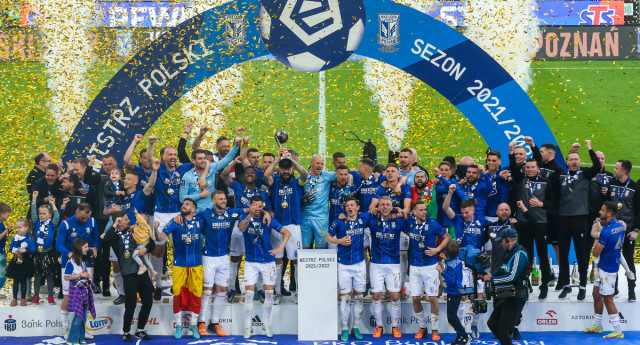
Wiosną 2021 lechici wpadli w kryzys, który oznaczał rozstanie na siedem kolejek przed końcem sezonu z trenerem Dariuszem Żurawiem. Tydzień później drużynę poprowadził przeciwko Legii Warszawa (0:0) jego asystent - Janusz Góra. Na trybunach siedział już jednak Maciej Skorża, dla którego był to powrót do Kolejorza po ponad pięciu latach. Ostatecznie poznaniacy zajęli jedenaste miejsce w tabeli, najniższe od 2006 roku, kiedy klub przejęła rodzina Rutkowskich. Nowy szkoleniowiec mógł w ostatnich starciach poznać drużynę i podjąć decyzje kadrowe w kontekście kolejnych rozgrywek.
Dodajmy, że przed tym sezonem w Poznaniu zakontraktowany został napastnik Mikael Ishak, który stał się z miejsca gwiazdą i jednym z ulubieńców kibiców, zapracował zresztą od razu na miano najlepszego strzelca w całej Lidze Europy. Zimą z kolei pojawili się Jesper Karlstrom, Bartosz Salamon czy Antonio Milić, czyli kolejni architekci mistrzostwa Polski 2022.
Latem 2021 klub wkroczył w sezon, w trakcie którego były obchody stulecia oficjalnej rejestracji. Urodziny musiały być szczególne i były! 19 marca 2022 roku przy Bułgarskiej odbył się mecz rocznicowy z Jagiellonią Białystok (3:0), który miał szczególną oprawę. Przed pierwszym gwizdkiem sędziego Liber zaśpiewał odświeżoną wersję piosenki „Czysta gra”, która powstała, kiedy klub miał 85 lat. Na murawie obie ekipy wystąpiła w strojach retro, nie zabrakło też specjalnej iluminacji rocznicowej. Były też inwestycje w infrastrukturę - największą w historii inwestycją była budowa Centrum Badawczo Rozwojowego Akademii Lecha we Wronkach.
Najważniejsze było jedna to, co na boisku. Kolejorz prowadzony przez trenera Macieja Skorżę, który wywalczył wcześniej mistrzostwo w 2015 roku, od początku sezonu był w ścisłej czołówce. Przez wiele kolejek był liderem. Nie brakowało jednak dramaturgii. Długo prowadzący Lech stracił pozycję lidera na rzecz Rakowa Częstochowa, który na trzy kolejki przed końcem miał wszystko w swoich rękach. 2 maja obie ekipy spotkały się na Stadionie Narodowym w Warszawie w finale Pucharu Polski, częstochowianie wygrali 3:1 i sięgnęli po trofeum. Kluczowa w ekstraklasie była jednak seria 32. W niedzielę 8 maja najpierw Raków zremisował z Cracovią (1:1), a chwilę potem grał Kolejorz, który wykorzystał swoją szansę. Ograł w Gliwicach Piasta 2:1, gola na wagę trzech punktów Mikael Ishak wbił w 88. minucie, co wywróciło tabelę. Tydzień później wszystko było już jasne, to lechici cieszyli się z tytułu, bo wygrali w Grodzisku Wielkopolski derby z Wartą Poznań (2:1). Przyjechali na Bułgarską i obejrzeli ostatnie 20 minut starcia w Lubinie, gdzie Zagłębie w doliczonym czasie trafiło z Rakowem na 1:0 i w tym momencie stało się jasne, że złoto trafi do Poznania.
Spontaniczna feta obyła się 14 maja przed stadionem, a ta oficjalna z wręczeniem pucharu i medali tydzień później. Spójrzmy na serię sześciu kolejnych wygranych lechitów na finiszu. Kolejno ograli wówczas: Wisłę Płock (1:0), Górnika Łęczna (3:0), Stal Mielec (3:1), Piasta Gliwice (2:1), Wartę Poznań (2:1) oraz Zagłębie Lubin (2:1). Ba, niebiesko-biali byli o włos od klubowego rekordu kolejnych wygranych! Jak to możliwe? Nie przegrali w ostatnich dziewięciu kolejkach - zdobyli w nich 25 na 27 możliwych punktów. Jedyny remis był z Legią Warszawa (1:1) przy Bułgarskiej w meczu, w którym w doliczonym czasie gry należał się gospodarzom rzut karny. Gdyby został podyktowany, a jedenastka wykorzystana, to drużyna trenera Skorży wyrównałaby rekord należący do Adama Topolskiego i Lecha z jesieni 1998 - wtedy zaliczył on właśnie dziewięć kolejnych triumfów i ten wynik do dziś jest rekordowy.
Sezon 2022/2023 rozpoczął się jak w filmie Alfreda Hitchcocka - od trzęsienia ziemi. Po mistrzowskim sezonie odszedł bowiem trener Maciej Skorża, którego zastąpił holenderski szkoleniowiec John van den Brom. Miał bardzo mało czasu na zapoznanie się z nową drużyną. Sezon dla Kolejorza rozpoczynał się bowiem wyjątkowo wcześnie, bo już 5 lipca.
Wtedy bowiem startowały eliminacje Ligi Mistrzów, w których niebiesko-biali trafili na Karabach Agdam. Przy Bułgarskiej było 1:0 po golu niezawodnego Mikaela Ishaka, a w rewanżu - bolesna porażka 1:5 w Azerbejdżanie. Nie ma jednak tego złego, co by na dobre nie wyszło. Rozpoczęła się bowiem niesamowita przygoda pucharowa, która trwała blisko dziesięć miesięcy i zaprowadziła Lecha do historycznego europejskiego wyniku, bo pierwszy raz klub znalazł się w ćwierćfinale.
Było to w Lidze Konferencji Europy, do której zespół doprowadziło wyeliminowanie gruzińskiego Dinamo Batumi (5:0, 1:1), islandzkiego Vikingura Reykjavik (0:1, 4:1 po dogrywce), a także luksemburskiego F91 Dudelange (2:0, 1:1). W fazie grupowej wywalczyliśmy dziewięć punktów, a awans dała efektowna listopadowa wygrana nad hiszpańskim Villarreal CF (3:0) po dwóch golach Michała Skórasia, a także jednym Kristoffera Velde. Lechici sami wzięli sprawy w swoje ręce, bo przed ostatnią kolejką wiedzieli, że uzyskają promocję, jeśli wygrają. Wtedy nie musieli się oglądać na konfrontację izraelskiego Hapoelu Beer Szewa z Austrią Wiedeń. W fazie play-off los skojarzył z norweskim Bodø/Glimt. Na wyjeździe był bezbramkowy remis, a przy Bułgarskiej 1:0 po trafieniu niezawodnego Ishaka, który w trakcie sezonu przedłużył kontrakt z Lechem i pracuje w nim na miano legendy. W trakcie poprzednich rozgrywek ścigał najskuteczniejszego do tej pory obcokrajowca w historii Kolejorza - Duńczyka Christiana Gytkjaera.
Lech stał się pierwszym polskim klubem od 32 lat, który wyeliminował rywala wiosną w europejskich pucharach. I poszedł za ciosem, bo wyrzucił za burtę także kolejnego, co pozwoliło wyrównać osiągnięcie Górnika Zabrze sprzed ponad pół wieku. W dwumeczu 1/8 finału nie pozostawił wątpliwości szwedzkiemu Djurgårdens IF (2:0, 3:0). W walce o półfinał wpadł na włoską Fiorentinę - w Poznaniu było 1:4, a w rewanżu we Florencji po nieco ponad godzinie gry piłkarze trenera Broma prowadzili 3:0, co wprawiło w osłupienie przeciwników oraz miejscowych kibiców. Włosi jednak wbili w końcówce dwa gole i zakończyli piękną przygodę Lecha.
Zespół rozegrał w sezonie 2022/2023 aż 56 meczów! Oprócz 34 w PKO BP Ekstraklasie, także 20 w europejskich pucharach oraz po 1 w walce o Superpuchar i w Pucharze Polski. Te 20 w międzynarodowych rozgrywkach to rekord w jednym sezonie w całej Europie, Kolejorz wyrównał osiągnięcie kilku innych zespołów. Potrafił też w tym maratonie połączyć puchary i ligę, w której zajął trzecie miejsce po emocjonującym finiszu.
Next matches
Saturday
07.02 godz.20:15 Górnik Zabrze
Górnik Zabrze
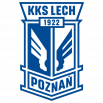 Lech Poznań
Lech Poznań
Recommended
Newsletter
Subscribe










